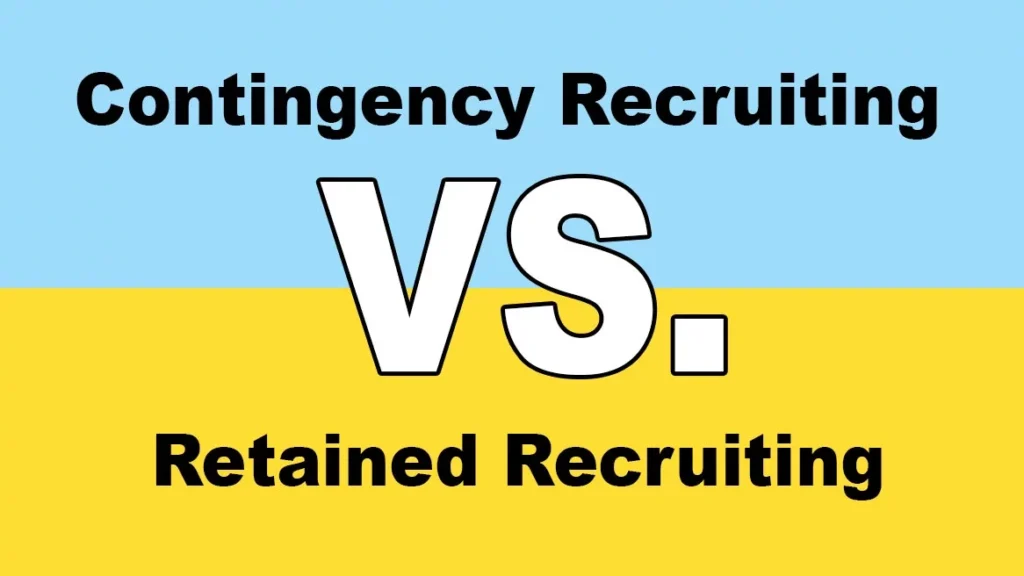Retained vs. Contingency Cost Effective: Which Recruiting Option Is Best Suit For Business?
Retained vs. Contingency Cost Effective: Which Recruiting Option Is Best Suit For Business?
October 24, 2023
While both contingency and retained search offer distinct advantages, unearthing the answer to the retained vs contingency cost-effective conundrum could hold the key to unlocking a recruitment strategy that's both effective and budget-friendly.


We understand the complexity and financial constraints businesses face during recruitment. Recruiting new talent is a critical process for any organization, and finding the right recruitment strategy can greatly impact the quality of hires and the overall cost of the hiring process. Two standard options in the recruitment industry are retained search and contingency search. This article aims to dissect the retained vs contingency cost-effective debate, shedding light on their respective financial impacts.
Understanding retained search fees
Retained search is a recruitment approach where a company engages a recruiting agency exclusively to fill a specific position. This arrangement involves a retainer fee paid upfront, which is usually a percentage of the anticipated total placement fee. Here are some key advantages of retained recruitment from a cost perspective:
Benefits of retained recruitment from a cost perspective
- Comprehensive search process: Retained recruiters dedicate significant time and resources to thoroughly understanding your company’s needs and finding top-tier candidates. This approach leads to a more targeted and efficient hiring process, potentially reducing costs in the long run.
For example, a retained recruiter may conduct extensive market research and use their network to identify suitable candidates who may not actively be seeking new opportunities.

- Commitment to finding the best fit: With a retained search, recruiters have a vested interest in identifying highly qualified candidates who match the client’s requirements. This commitment often leads to more thorough vetting processes, resulting in candidates who are better suited for the role and reducing the chances of making costly hiring mistakes.
- Reduced time-to-fill: Retained searches typically prioritize filling the position promptly. The exclusive nature of the engagement allows recruiters to focus solely on the client’s needs, thereby expediting the hiring process. As time-to-fill decreases, associated costs such as lost productivity due to vacant positions can be minimized.
- Customized recruitment strategies: Retained search firms work closely with clients to understand their unique culture, goals, and hiring needs. This collaboration enables tailored recruitment strategies that attract candidates who align with the organization’s long-term objectives. By fostering cultural fit, the likelihood of employee turnover decreases, saving the company costs associated with frequent rehiring and onboarding.
Potential drawbacks and considerations of retained recruitment cost
Despite the advantages of Retained Recruitment, there are some potential drawbacks and considerations to keep in mind when assessing the cost-effectiveness of retained recruitment:
- Higher initial investment: Retained search fees are typically higher than contingency fees due to the upfront retainer. This financial commitment may deter some organizations, especially smaller ones with limited budgets. However, it’s essential to weigh this against the potential long-term savings derived from better-quality hires and reduced turnover.
- Limited flexibility: Engaging a retained search means committing exclusively to that agency for the duration of the search process. This lack of flexibility can be a disadvantage if the client wishes to explore multiple recruitment options simultaneously or switch to a different agency midway. Organizations should carefully consider their specific needs and priorities before opting for a retained search.
- Higher overall cost for multiple hires: If you have multiple positions to fill, the costs of retained search fees can add up. However, the cumulative value of finding high-quality candidates and reducing turnover costs should be taken into account when assessing the overall cost-effectiveness.
Factors influencing the cost of retained recruitment
To determine the cost-effectiveness of retained recruitment, it is crucial to understand the factors that influence the overall cost:
- Complexity of the position: The more specialized or senior-level the position, the more extensive the search may be to find qualified candidates. This increased effort can result in higher fees due to the additional time and resources required.
- Market demand for specific skills: Highly sought-after skill sets and competitive industries may influence the cost of retained search services. The scarcity of qualified candidates can impact the fees charged by recruiters.
- Geographical location: The cost of retained recruitment can also vary based on the region or country where the search is conducted. Factors such as market demand, competition, and local economic conditions can influence the fees charged by search firms.
Understanding contingency search fees
Contingency search operates differently from retained search. In this model, multiple recruitment agencies compete to fill the same position, and the client only pays a fee upon successful placement. Here’s an explanation of how contingency recruitment fees are typically structured:
Advantages of contingency recruitment from a cost perspective
- No upfront costs: Unlike retained search fees, contingency recruitment does not require an upfront retainer fee. Companies only pay upon the successful placement of a candidate. This payment model can minimize financial risk, especially if the hiring needs are uncertain or fluctuating.
- Payment only upon successful placement: Companies using contingency recruitment methods only pay the agreed-upon fee once a candidate is successfully hired. This payment structure aligns the recruiter’s incentives with the company’s goal of finding the right fit.
Ability to engage multiple agencies simultaneously: Contingency recruitment allows companies to work with multiple agencies simultaneously, increasing the pool of potential candidates. This competitive environment can lead to a wider range of options and potentially more favorable terms.

Potential drawbacks and considerations of contingency recruitment cost
- Competition for top candidates: Since multiple agencies are involved in contingency recruitment, each may present different candidates for consideration. This lack of exclusivity can result in duplication of efforts, confusion, and potential clashes between agencies if they present the same candidate to the client. Coordination and communication become crucial to avoid wasting time and resources.
- Lower level of agency commitment: In a contingency search, recruiters are only paid upon successful placement. This payment model may lead to less dedication and thoroughness in the screening and vetting process compared to retained search, where recruiters have a higher level of commitment and accountability.
- Potential for lower-quality candidates: Contingency recruitment often prioritizes filling the position quickly to secure the fee, which may result in less emphasis on cultural fit and long-term compatibility with the organization. This can lead to potential turnover costs if a hastily hired candidate does not align with the company’s values and goals.
Factors influencing the cost of contingency recruitment
- Level of competition for candidates: The availability and demand for specific skills or positions can impact the cost of contingency recruitment. If there is high competition among companies seeking candidates with a particular skill set, recruiters may charge higher fees to secure top talent.
- Specific hiring requirements: The complexity and specific requirements of the position can influence the cost of contingency recruitment. Positions that require unique qualifications or experience may require more extensive search efforts, potentially affecting the overall cost.
- Time sensitivity of the position: If there is a time constraint or urgency in filling a position, recruiters may need to prioritize resources and allocate additional effort to expedite the hiring process. This can result in higher costs for contingency recruitment services.
How to choose the right option based on retained vs contingency cost-effective
When deciding between retained and contingency recruitment options, besides the pros and cons of contingency fees, it’s important to consider various factors that contribute to cost-effectiveness. Here are some considerations to help you make an informed decision:
- Assessing company goals and priorities: Evaluate your company’s long-term objectives and hiring goals. Determine if you prioritize quality over speed or have a specific focus on finding highly specialized talent.
- Analyzing hiring needs and volume: Consider the number of positions you need to fill and the frequency of hiring. If you have ongoing or frequent hiring needs, the cost structure and scalability of each option should be taken into account.
- Considering budgetary constraints and cash flow: Evaluate your organization’s budgetary limitations and determine how much you can allocate to the recruitment process. If you have more financial flexibility and value long-term quality hires, a retained search may be worth the higher initial investment.
- Evaluating time sensitivity and urgency: Assess the urgency of filling the position. If time is of the essence and you need a quick turnaround, contingency recruitment may be more suitable as it allows for simultaneous engagement with multiple agencies.
- Consulting with recruitment professionals or agencies: Evaluate your existing relationship with recruitment agencies. If you have worked successfully with a particular agency in the past and trust their expertise, engaging them on a retained basis may strengthen the partnership and enhance the quality of candidates presented.
Both contingency vs retained search have their advantages and considerations in terms of cost-effectiveness. In the comparison of retained vs contingency cost effective approaches, retained recruitment frequently emphasizes a comprehensive and targeted strategy, prioritizing quality over quantity. On the other hand, contingency recruitment provides flexibility and decreased financial risk. It’s crucial to assess your company’s goals, hiring needs, budgetary constraints, and urgency to make an informed decision about which option aligns best with your specific requirements. Consulting with recruitment professionals can further assist you in determining the most cost-effective choice for your organization.



